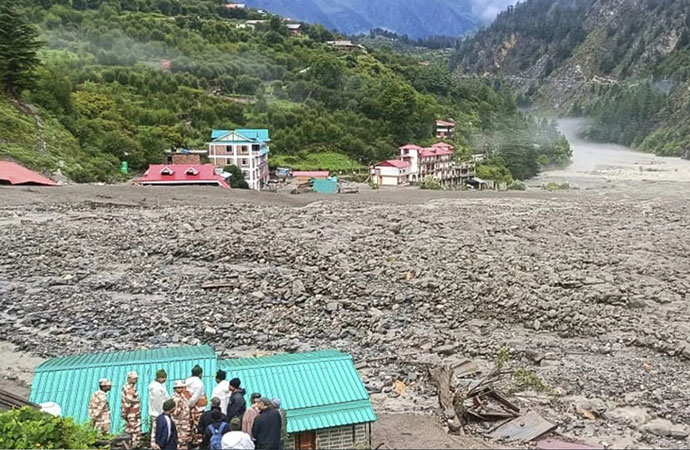Column

Image: Screenshot
I remember once seeing a political advertisement that featured a forlorn matriarch of the native Americas in gorgeous ethnic dress. The caption went like this: "People look at what we wear. They don't see who is wearing them."
In the advertisement, the exotic clothing is strikingly visible: What it obscures is the marginalisation of the human living within those garments. Her invisibility attests to the way in which the so-called march of progress trivialises the wayside-fallen, those who, in a broader global context, have been called the war-disabled of competition. War is not only the physical extinction of the vanquished by the victorious: It is the ideational disablement of survivors in the victor's version of history.
There is nothing as powerful as social invisibility in erasing the existence of the dispossessed, the deprived and the denied from the living archives of common human memory. In the Social Darwinian competition for class, gender, ethnic, religious or national hegemony, which is not just rationalised but is valorised as evolutionary progress, the contrarian struggle for equity, equality, recognition and respect is beaten out of sight, either through the force of imposed arms or through the power of imbibed habit. Once accepting the social invisibility of others becomes a personal habit, there is no need for praetorian weapons any more. The unseen tell no tales except in silence.
The Bede community of Bangladesh is luckier than many other indigenous remnants of the human advent on earth. The Bede have not been exterminated in genocidal numbers as have Native Americans, in the deadly spirit of the "discovery" of the Americas in 1492 by Christopher Columbus, whom Noam Chomsky calls the greatest mass murderer in history. The Bede are much better off than Australian Aborigines, whose 60,000 years of continuous existence on the continent were interrupted by the murderous arrival of European colonialism in 1788 in a disaster that decimated them, stole their land, and appropriated their founding myths and living traditions into an astonishing narrative of imperial improvement.
The disinherited peoples of confiscated lands have no one to go to. World history is not a policeman. It has never been that and will never be.
And so runs the tale of dispossession through the sorry annals of global time.
The Bede are different: Bengal's history has not decimated them. However, it has not spared them either. They are an ancient and nomadic ethnic group that survived traditionally by being water or river gypsies. In an unbelievable irony, they are not cherished today in Bengal, which is by definition a riverine creation.
Rivers define Bengal's geographical provenance. Naturally, therefore, many of its inhabitants have lived and continue to live on or along its rivers and make a living from ancestral waters. No territorial partition, no politics of nationhood based on faith or caste or ideology, no technological marvels, no degree of artificial intelligence, no threat of nuclear extinction can remove them from the material reality of the concrete map of Bengali existence on earth. Poorly educated (if not illiterate, as some of them are) the Bede might not know how important they are to Bangladesh. But Bangladesh must know how important the people of the rivers are to its water-borne sense of itself.
The reality is different. One account of the Bede condition summarises the issue thus: "The term 'Bede marginalisation' refers to the social and economic exclusion faced by the Bede... They have historically been marginalised due to their nomadic lifestyle, limited access to resources, and lack of formal education and political representation. This marginalisation has resulted in poverty, limited access to healthcare and education, and vulnerability to exploitation."
In a 2022 paper for Social Science Review, sociologists Ayesha Siddequa Daize and Laboni Akter Lima of Dhaka's Jagannath University refer to the "floating people" of Bangladesh and write evocatively that the name "Bede" invokes images of women roaming through villages carrying bags of merchandise on their heads and calling out to attract customers, to whom they offer treatment for joint pains and toothache, and sell products such as home utensils, trinkets, amulets, bangles and herbal medicines. "Generally, these groups of people are socially, economically, and politically excluded and they are severely deprived of all types of necessities. Often, they become victim(s) of discrimination and racial violence and obviously they are the subject of human rights violations." Yet, the Bede possess immense power to adapt their traditional livelihoods, amidst the vulnerability of their current social and economic status, to their circumstances, the authors go on to add in an inspiring article.
What is necessary, at all costs, is to avoid the temptation to exoticise the Bede as embroidery on the quilt of Bangladeshi ethnography. They do grace the Bangladeshi landscape by their very presence, of course, but they are not tourist attractions today destined to be museum pieces tomorrow or simply photogenic people in between (although their women are, indeed, enchantingly beautiful). The Bede condition must be normalised, not reified. That is, the Bede must be seen, not as some kind of quaint cosmic gift to Bangladesh but as an intrinsic expression of historical processes that have produced both beauty and poverty, both rivers and drought, and both poets and criminals across the land of Bengalis.
Social media are a great weapon against social invisibility. There are several videos on the Bede that reveal their position within the great global arc of cultural materialism, a concept developed by Raymond Williams within the tradition of the Frankfurt School to capture the provenance of a particular moment in history. Culture is a mode of production that includes residual, emergent and oppositional elements. Cultural materialism focuses particularly on the marginalised in order to remind the mainstream that it, too, is a tributary of history and that rivers can flow into the seas of universal time.
In that spirit, the Bede deserve not the condescension of society and its media but the recognition of commonality in the midst of difference.
The writer is Principal Research Fellow of the Cosmos Foundation. He may be contacted at epaaropaar@gmail.com

























Leave a Comment
Recent Posts
Religion and Politics: A Toxic ...
At Dhaka University, cafeteria workers have been told not to wear shor ...
Enayetullah Khan joins AsiaNet ...
AsiaNet’s annual board meeting and forum was held in Singapore, ...
In a New York minute
Many leaders back a UN call to address challenges to ..
Defaulted loans at Non-Bank Financial Institutions ( ..
How the late Zubeen Garg embodied cultural affinitie ..